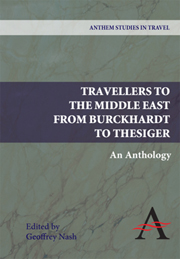Book contents
- Frontmatter
- Contents
- Acknowledgements
- Introduction
- PART ONE THE COMING OF EMPIRE 1800–1879
- PART TWO COLONIALISM AND RESISTANCE 1880–1950
- Ottoman and Former Ottoman Territories
- 1 A Wandering Scholar in the Levant
- 2 Dar-ul-Islam
- 3 Turkey in Revolution
- 4 An Englishwoman in a Turkish Harem
- 5 Three Deserts
- 6 Letters from Palestine, 1932–1936
- Arabia
- Persia/Iran
- Bibliography
1 - A Wandering Scholar in the Levant
from Ottoman and Former Ottoman Territories
Published online by Cambridge University Press: 05 March 2012
- Frontmatter
- Contents
- Acknowledgements
- Introduction
- PART ONE THE COMING OF EMPIRE 1800–1879
- PART TWO COLONIALISM AND RESISTANCE 1880–1950
- Ottoman and Former Ottoman Territories
- 1 A Wandering Scholar in the Levant
- 2 Dar-ul-Islam
- 3 Turkey in Revolution
- 4 An Englishwoman in a Turkish Harem
- 5 Three Deserts
- 6 Letters from Palestine, 1932–1936
- Arabia
- Persia/Iran
- Bibliography
Summary
Orientalist scholars with specialist knowledge about an essentialist Orient were pressed into service as Western ‘territorial acquisition in the Orient increased’ (Said 1978: 223). This was especially the case as Britain and France parcelled out Asiatic Turkey between themselves; Said listed David Hogarth among the key ‘experts’ who aided this process. Hogarth was an academic whose Classical interests drew him to the Eastern domains of the Ottoman Empire, as confirmed by the title of his travel narrative: A Wandering Scholar in the Levant (1896). He began his travels there in 1887 and as a specialist with interests in the ancient Hittites returned in 1890. Academic recognition came with the publication of Phillip and Alexander of Macedon in 1887, and in the same year Hogarth was appointed Director of the British School of Athens. Confirmation of his fame as an archaeologist came when he was made a fellow of the British Academy in 1905. His interest in the Arab lands developed in the early 1900s and he published his account of Western exploration of that region, The Penetration of Arabia, in 1904. But it wasn't until the summer of 1916, when he went to Jeddah as part of a British delegation to negotiate with Husayn Sherif of Mecca, that Hogarth actually set foot on the Arabian Peninsula. By this time he was director of the Cairo Arab Bureau ‘of intelligence and diplomatic officers…[set up] to organize Britain's role in the Arab Revolt’ (Mansfield 1992: 168).
- Type
- Chapter
- Information
- Travellers to the Middle EastAn Anthology, pp. 142 - 147Publisher: Anthem PressPrint publication year: 2009



